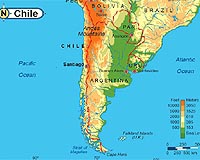 |
Palo Alto, CA (SPX) May 10, 2011 Accurately calculating the amount of carbon dioxide emitted in the process of producing and bringing products to our doorsteps is nearly impossible, but still a worthwhile effort, two Carnegie researchers claim in a commentary published online this week by Proceedings of the National Academy of Sciences. The Global Ecology department's Ken Caldeira and Steven Davis commend the work of industrial ecologist Glen Peters and colleagues, published in the same journal late last month, and use that team's data to do additional analysis on the disparity between emissions and consumption in different parts of the world. Caldeira and Davis point out that carbon is released at many stages of the production process including the energy used in creating each component of a product, CO2 released in making the manufacturing equipment, and carbon released by vehicles transporting factory workers to and from their jobs. "Very quickly, we see that nothing exists in isolation and that to understand how much emission can be related to any particular action, we must have a reasonable accounting system that allocates total CO2 emissions to specific actions," Caldeira said. "The accounting system must conform to our intuitions about how responsibility should be shared among participants in complex systems." Caldeira and Davis say Peters and his team are leaders in asking questions about how much CO2 consumption in the United States and other developed countries-used here to signify nations that made commitments under the Kyoto Protocol- is supported by CO2 in developing countries. The earlier PNAS-published study looked at the impact of goods and services that were consumed in developed countries, but produced in developing ones. Peters and team found decreased emissions in the former since 1990, and increased emissions in the latter. But when emissions from the production of goods were transferred to the place where the goods were consumed, then the trend in developed countries was reversed. The Carnegie scientists took this data and broke it down in terms of per-capita and per-dollar gross domestic product. They found that on a per-capita basis the average person in developed countries is responsible for more CO2 emissions than his or her counterpart in the developing world. And the amount of CO2 emitted per dollar of GDP is improving at similar rates between the two categories. Caldeira and Davis concluded that "the focus on territorial emissions ... has perhaps led us to underemphasize the role of consumption of goods and services in driving these emissions. It is important to look at all drivers of emissions, as everyone along the supply chain has a vested interest in the benefits that accrue from our fossil-fueled global economy."
Share This Article With Planet Earth
Related Links Global Trade News
 Booming Chile grapples with uneven growth
Booming Chile grapples with uneven growthSantiago, Chile (UPI) May 9, 2011 Chile's economy is booming but officials warn currency appreciation, inflation and continuing dependence on commodities exports all carry risks that can spoil chances of consistent growth in the coming months. National Statistics Institute data indicated inflation was a continuing problem. Consumer prices rose 0.3 percent in April from March, data from the institute showed. The annual i ... read more |
|
| The content herein, unless otherwise known to be public domain, are Copyright 1995-2010 - SpaceDaily. AFP and UPI Wire Stories are copyright Agence France-Presse and United Press International. ESA Portal Reports are copyright European Space Agency. All NASA sourced material is public domain. Additional copyrights may apply in whole or part to other bona fide parties. Advertising does not imply endorsement,agreement or approval of any opinions, statements or information provided by SpaceDaily on any Web page published or hosted by SpaceDaily. Privacy Statement |